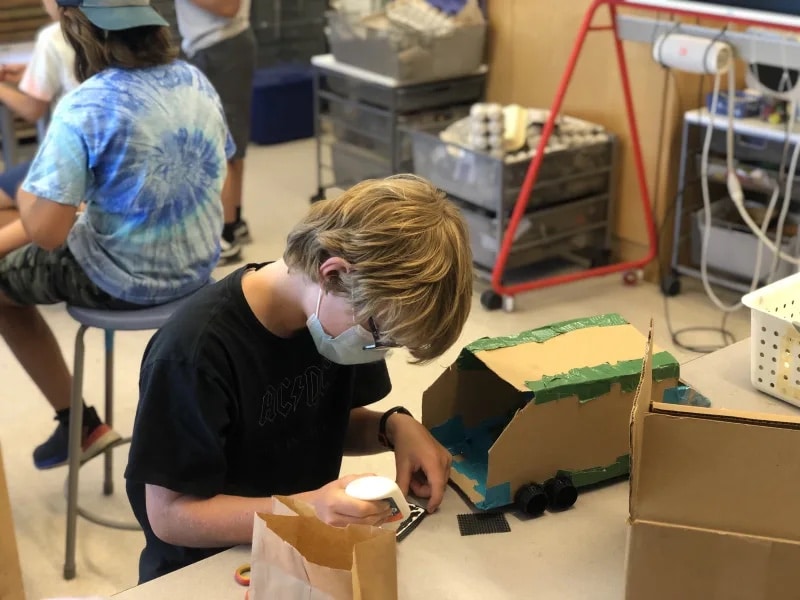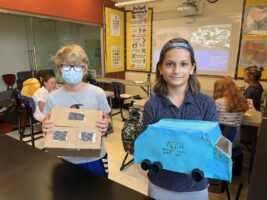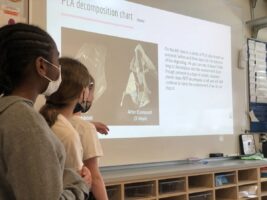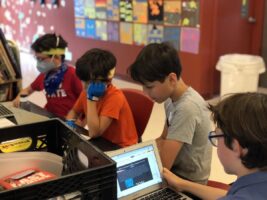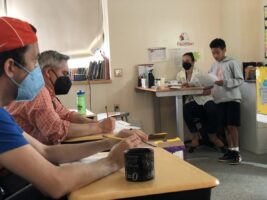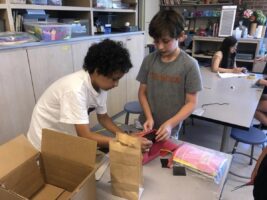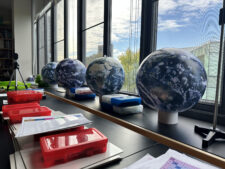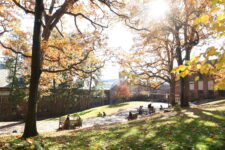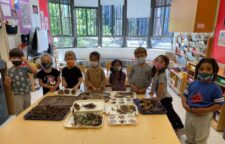On a warm Thursday in June, three Fieldston Lower students anxiously approach the front of the classroom. The day is finally here — students will present their inventions to the mysterious sharks as the weeks-long 5th Grade Shark Tank project comes to a close.
“Bio-loons. A party without plastic!” the students announce in unison. “Here at Bio-loons, we make and sell all natural, environmentally friendly balloons. From birthday parties to Mother’s Day, we’ve got balloons in every shape and size.” This particular group has researched, designed, and created a prototype for a biodegradable balloon using polylactic acid plastic.
Inspired by the popular entrepreneurial TV show, “Shark Tank,” the project incorporates design, research, persuasive writing, public speaking, advertising, and thinking about real-world applications. According to 5th Grade teacher Rebecca Butler, it all starts with one thought-provoking question that students grapple with in their Social Studies classes all year long: “What strategies do people use to create change?”
Students are tasked with developing a business model for a product that would benefit our planet in the wake of the climate crisis. Before they begin inventing, students engage with copious amounts of research and write persuasive essays about their chosen topic. “They research these complex issues by utilizing vetted articles and library databases,” Butler says. “During this time, students identify the issues and stories that feel most relevant and powerful to them.”

Students are motivated to think ethically about environmental issues by learning about the effects of electrical demands and fossil fuels, the need for animal conservation, and the realities of pollution. “We encourage them to dream big, fact-check, and to use statistics, which are then used as part of their arguments to influence others to join their concerns,” explains Butler.
On a recent visit, students were preparing and practicing for their upcoming presentations. Traditionally, members from the Fieldston Upper Environmental Club act as the investor panel — otherwise known as the “sharks” — but this year, students were told the panel would be comprised of faculty and staff, their identities kept secret until the presentation. It is safe to say they were wary of a visitor in their classroom asking probing questions; although I assured them that I was not in fact a shark, they were prepared with detailed answers. Inventions ranged from hybrid garbage trucks, toilets with composting capabilities, and energy-efficient drones that can track animals and administer medications to “Solar Pet” home charging stations, and silicon straws.
5th Grade teachers Dani Cardia ’07 and Debbie Veetal are consistently inspired by the creativity and curiosity of their students each year: “The design-thinking and problem solving requirements of this project have the students considering alternatives to some of our everyday needs, from water to electricity to commuting; they re-envision how these systems could operate,” says Cardia. “I really appreciate how enthusiastic the students are about their projects and how invested they become,” adds Veetal.
The cumulative nature of the project allows students to develop a comprehensive understanding of the interconnectedness of the world. “Students who choose to focus on plastic waste realize that this pollution isn’t just harmful to sea life, but also makes its way up the food chain to us. Plus, these materials are made using fossil fuels, so the students start to connect their research and collaborate with a group focused on renewable energy,” explains Cardia.
After weeks of research, designing a prototype, and preparing their presentation remarks, students were ready to face the sharks. They excitedly stirred with anticipation as they finally learned the identity of their prospective investors: Fieldston Lower Principal Joe McCauley, Learning Support Specialist Matthew Panek, Technology and Ethics Coordinator Felipe Cocco, Assistant Principal of Academic Life Taina Coleman, Ethics teacher Laura Stewart, and Diversity, Equity, and Inclusion (DEI) Coordinator Timothy Garcia.
As the “Shark Tank” theme song played in the background, one group — The Hermes Project — approached the front of the room and began their pitch. The Hermes Project aimed to install wind turbines at the end of airport runways to collect energy from landing planes. “It’s simple science really,” explained one student. “We’d use the energy produced by planes to power the airport. All we need is a one million dollar investment to get started. Next, we want to look at railways.”

